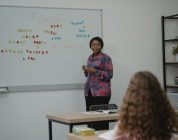![[object Object]](https://www.cheapteflcourses.com/wp-content/uploads/2025/10/34443781.jpg)
As an English teacher abroad, you prepare for cultural differences. You expect unfamiliar foods, different greetings, and unique classroom dynamics. Nothing, however, quite prepares you for the moment when you become an unintentional character in a historical narrative you didn’t write.
A School Play Unlike Any Other
Imagine sitting in a school auditorium, watching your students perform. The younger grades present charming, light-hearted skits. Then, your own sixth-grade class takes the stage.
The scene unfolds not as a fairy tale, but as a stark historical depiction. The students, using prop guns, reenact a traumatic wartime event. The narrative portrays foreign soldiers invading their homeland. The climax is devastating: a mother is forced to make an impossible, tragic choice.
The final line from the children hangs in the air, a direct commentary connecting the historical event to the present day. In that moment, you are no longer just their teacher. You feel the weight of being seen through the lens of a complicated history.
The Aftermath: An Unspoken Divide
When the curtain falls, the atmosphere shifts palpably. The camaraderie of the school day evaporates.
- The teachers seem awkward, avoiding eye contact.
- The parents offer glances that are hard to read, but unmistakably different.
- The students themselves become distant, pulling away from the easy-going relationship you worked so hard to build.
You leave quickly, the joyful school environment suddenly feeling alien. The question lingers: Have the perceptions of the younger children, who once saw you as a friendly face, now been permanently altered?
Navigating the Weight of History
This experience highlights the complex role of an educator in a foreign land. It forces a confrontation with several challenging truths.
Historical memory is lived and taught differently around the world. Events that might be a distant chapter in one country’s textbook are visceral, community-held memories in another. Schools often serve as the guardians of this memory.
Cultural comfort zones vary dramatically. Topics considered too heavy or inappropriate for children in one culture can be seen as essential lessons of remembrance in another. There is no universal manual for what is “suitable” for a school play.
For the teacher caught in the middle, the personal and professional become intertwined. The challenge is to reconcile your own cultural background with your role as a respectful guest in your host country. It’s about acknowledging painful history without personally owning the blame, and maintaining your identity while understanding how others might perceive you.
Finding a Path Forward
So, what comes next? The initial shock will fade. Children are resilient, and daily routines have a way of restoring normalcy. The classroom relationships you’ve nurtured have a foundation that can withstand this tremor.
This uncomfortable experience, while jarring, is a profound lesson in cross-cultural empathy. It’s a reminder that we teach not just a language, but also through our actions and reactions. By returning to the classroom with understanding and a steady presence, you teach the most powerful lesson of all: that while history is complex, human connection can bridge the divides it creates.




